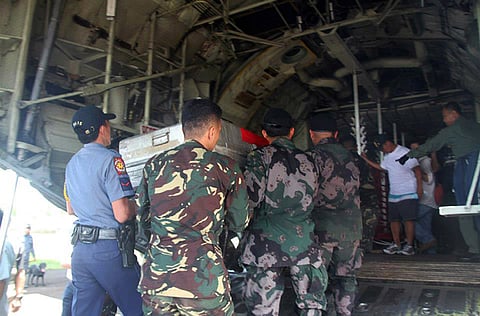Safety standards question after Robredo’s death
Philippine interior secretary’s demise causes aviation industry to look within

Manila: The death of Interior and Local Government Secretary Jesse Robredo and two pilots off Masbate City in central Philippines last Saturday has questioned the integrity of the Philippine aviation industry, including the kind of regulation imposed by the Civil Aviation Authority of the Philippines (CAAP) on planes, pilots, flying schools and companies that charter planes, industry sources told Gulf News.
Robredo was the second VIP to die in a plane crash after former President Ramon Magsaysay died when his plane, a Douglas C-47, named Mount Pinatubo crashed on the slopes on Mount Manunggal in Cebu, central Philippines on March 17, 1957.
“An investigation on why Aviatour’s Piper Seneca Class 1 crashed and resulted in the death of Secretay Robredo and the planes’ two pilots might reveal a can of worms on the state of the Philippine aviation industry,” said Meynard Halili, owner of Airworks, a school of flying.
"[In a positive light], last Saturday’s plane crash should also open the gateway to a safer Philippine aviation industry,” said Halili, adding, “But only an honest and competent government can stop irregularities in the industry.”
At the same time, Aviatour’s four-seater two-engine Piper Seneca 1 plane, owned and piloted by Capt. Jessup Bahinting, was found to have no emergency locator transmitter (ELT), which made it harder for members of the search and rescue operation to do their job in locating the lost plane, a hard undertaking that began on Saturday night and ended on Tuesday morning.
The installation of the gadget, estimated to cost from $2,000 (Dh7,344) to $5,000 could have fast-tracked the search and rescue operation in locating the bodies of Robredo and the two pilots, said another source.
Moreover, a plane crash is always blamed 80 to 100 per cent on human error, meaning the pilot’s and the plane’s maintenance mechanic, both of whom are licensed for good track records, said Halili.
“A real good pilot walks under the plane to make his own maintenance check on the air worthiness of his plane. He does not and should not always depend on the pre-flight check done by inspectors. This healthy skepticism makes a pilot’s flight always safe,” said Halili, adding that the pilot who skips this already constitutes a violation.
William Hotchkiss, CAAP director general, has also ordered the temporary grounding of all Piper Seneca aircraft in the country immediately after erports that Aviatour’s Piper Seneca crashed off Masbate City on Saturday.
On Sunday, Captain Antonio Jureidini, Aviatour’s flight school director, also announced that the company voluntarily grounded its 12 planes.
“All our aircraft before charter are [air] worthy,” Jureidini insisted.
CAAP inspectors conduct yearly inspection of planes used by flying schools and companies that charter planes. Its certification has 12-month validity. Certificate of air worthiness of planes is done as planes check in and out; preventive maintenance section is implemented every 25 hours of flight.
The Aircraft Accident Inquiry and Investigation Board (AAIIB), which is headed by Capt. Amado Soliman, also president of the Air Safety Foundation of the Philippines, a watchdog, has scheduled the investigation of the plane crash.
Its recommendation will be handed to CAAP, which will determine if the licences of erring company, pilot, and mechanics will be suspended or revoked.
In 2007, a bill was filed in Congress for the abolition of the now defunct Air Transportation Authority to pave the way for the creation of the CAAP, identified as an independent regulatory body with quasi-judicial and quasi legislative powers. Former President Gloria Arroyo signed the bill into a law in March 2008.
Earlier, on January 17, 2008, the United States Federal Aviation Administration already downgraded the Philippines from Category one to Category 2, because of the defunct ATO’s failure to satisfy regulatory international safety standards.
The downgrading prevented the expansion of air service of Philippine planes to the US.
As a result, the International Civil Aviation Organization’s also placed the Philippines under its Universal Oversight Audit Program.
On April 1, 2010, the European Union also banned Philippine carriers from flying to Europe.
The layers of downgrading have not been lifted.


